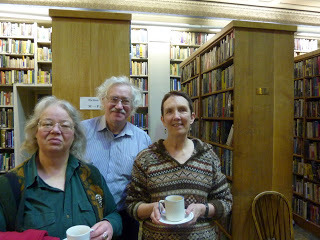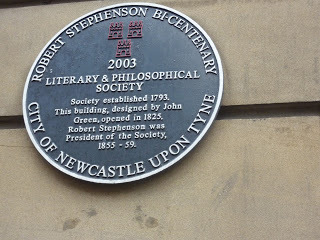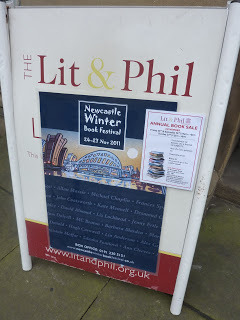Martin Edwards's Blog, page 254
December 7, 2011
End In Tears
I have written beforein this blog of my huge admiration for Ruth Rendell. At one time, I had readevery novel and short story she'd published, both under her own name and asBarbara Vine. In the past 10 years or so, however, I've missed a few titles,and I've rather felt that (with a few notable exceptions) her most recent bookshave not quite reached the remarkable standards of excellence that she set inthe past. But she remains a gifted writer, and I'm keen to fill in the gaps.
I decided that I'd tryan audio book version of one of her Wexford stories, and was tempted by End inTears, especially as it was read by Christopher Ravenscroft, who was so good ontelevision in the role of Detective Inspector Mike Burden. I really like theWexford series, and I also admired the performance of the late George Baker asa very believable television Wexford.
Again,however, I have felt that there has been something of a falling-off in the morerecent Wexford books. For my taste, Rendell became a little too anxious toshove some social comment into the stories, and in such a long-establishedseries, this occasionally seems a bit awkward and unconvincing. But I make thisobservation simply because I think Ruth Rendell is such a fine writer that sheought to be judged by the most demanding standards (most of the rest of us needjustice to be tempered with a liberal dose of mercy!)
Endin Tears is a well-constructed mystery, although not ideally suited to audiobook abridgement, which led to a slightly fragmentary narrative and perhaps toomany characters. The social comment element here is about surrogacy, and Ifound this fairly interesting. But the actual murder motive was, to my mind, genuinelyfascinating, and neatly concealed. This book may not rank with the best ofWexford, but it is still enjoyable and I'm glad I've caught up with it at last.
Published on December 07, 2011 01:30
The Resident
I started watching a2010 movie, The Resident, with high hopes. It's a short thriller from Hammer, starring that very appealing actressHilary Swank. She plays a doctor who does a lot of running to exercise hermortification at having split up with her philandering ex. She decides to moveapartments, and finds a new home that is full of character and remarkablycheap.
There is a 'but',of course. As soon as we meet the ownerof the building, played by Jeffrey Dean Morgan, we somehow suspect (for this isscarcely an original situation) that, for all his superficial likeability, he maywell turn into a deranged killer. This impression is confirmed when we findthat his strange granddad is played by – yes! - Christopher Lee.
Short the film may be,but I'm afraid that for me, it was still too long at an hour and a half. Ithought the screenplay was clunky as well as predictable, with a long-winded flashback killing suspense quite early on, and although visuallythe film is quite effective, with the weirdness of the building well evoked, overallit was a dreadful waste of the talents of three excellent actors.
Aspects of the storyare salacious, voyeuristic, and gory, and although very good films can be composedwith such elements The Resident is too crassly put together to survive its flaws.It hasn't received generally good reviews, and even some of the indifferentnotices strike me, I'm afraid, as rather on the generous side. Verydisappointing.
Published on December 07, 2011 01:00
December 5, 2011
Cry of the Owl - movie review
John Curran recommended me to give a try to Cry of the Owl, a 2008 movie based on Patricia Highsmith's book, written nearly 50 years ago and previously filmed, in a version I haven't seen, by Claude Chabrol. It's an interestingly different film, and you can never be sure how things are going to develop.
As so often with Highsmith, the characters behave oddly. A man called Forester, played by Paddy Considine, who has suffered depression and is getting a divorce from his gorgeous but rather unpleasant wife becomes obsessed by a couple who live in an isolated house in the woods. He spies on them, but in a curiously innocent way. The couple's relationship is in difficulty, and one night Jenny, the woman, played by Julia Stiles invites in the watcher. This is unexpected enough, but soon she starts stalking him. Her lover takes this amiss, and in a struggle, Forester hits him, but doesn't kill him.
However, the man disappears, and before long Forester is suspected of his murder. His world continues to fall apart. Jenny commits suicide and someone tries to kill Forester. The police react disbelievingly and he is suspended from work. I found a lot of this implausible, to say the least. And yet, strangely, I remained intrigued and wanted to find out what would happen next.
Suffice to say that the story didn't become any more plausible - far from it - but despite its flaws, I was glad I watched it. There was one nice twist and Considine's performance is very watchable. He is an actor with a good line in innocent weirdness.
Published on December 05, 2011 00:05
December 2, 2011
Forgotten Book - The Players and the Game
I first read JulianSymons' 1972 novel The Players and theGame as a break from A Level exams revision shortly after it first appeared. Iwas a huge Symons fan then – as I still am – and I really enjoyed the book. Awelcome distraction which did me a lot of good at the time, despite its grimsubject matter. So I wondered how well it would stand up to re-reading.
The answer was –extremely well. I now knew the trick solution, but this time had the chance toadmire how Symons concealed it from the reader. This is a book influenced bytrue crimes – notably the Moors Murders – where two people combine to wreakhomicidal mayhem. I'm one of the many who have more recently written such astory, but few of us have matched Symons' skill.
The book opens with anextract from a journal written by a mentally disturbed man who confuses himselfwith Count Dracula/Bela Lugosi, and meets a woman who sees herself as BonnieParker. The action then switches to a husband and wife buying a house; PaulVane is a personnel manager who is moving to be nearer his work, but the move proves to have disastrous consequences.
Two young women gomissing. One eventually turns up, but it soon becomes apparent that a serialkiller (or, rather, two serial killers) are on the loose. Symons shiftsviewpoint rapidly, introducing a good many characters, but he sketches themwith great clarity. Which man and which woman form the killer couple?
It's a really ingeniousstory, as clever as most Golden Age efforts, but it's worn really well, withonly a couple of aspects that seem dated. Symons explores the way that peoplewear masks to conceal their identities, and also provides a bleak picture of aman, Paul Vane, whose life falls apart. This is a really excellent mystery,much shorter than most present day serial killer stories and the better for it.I can't understand why it isn't more widely known.
Published on December 02, 2011 01:00
November 30, 2011
Ten Little Indians movie review
To be perfectly honest, I was expecting to hate the 1965 movie version of Agatha Christie's masterpiece And Then There Were None. Which is why I've managed to avoid watching it until now. But I decided to bite the bullet, and to my surprise found the film surpassed my admittedly low expectations.
The setting is a country house, of course, but this one is to be found at the top of an Alpine mountain accessible only by sleigh and cable car. The servants who greet the guests who have been invited by the mysterious U.N. Owen are locals, and when Owen's voice is played on a tape recording, I discovered that the uncredited actor who spoke the words was Christopher Lee (in a later version of the film, Orson Welles did the same job.)
The cast is pretty good, including Stanley Holloway, Dennis Price and Wilfrid Hyde White, as well as the ultra-glamorous ex-Bond girl Shirley Eaton, who gets to play a sex scene, albeit mild in the extreme, with Hugh O'Brian.
A notable feature of the movie is the 'whodunit break', an updated version of the Challenge to the Reader introduced in the Golden Age by Ellery Queen and also used by the likes of Rupert Penny and Anthony Berkeley. A gimmick, yes, but a pleasing one, at least to my mind. I enjoyed this film more than I should have done, perhaps. It ain't Martin Scorsese, but as light entertainment, it ain't that bad, either.
Published on November 30, 2011 00:44
November 28, 2011
Newcastle






I'm just back from a delightful week-end taking partin the Newcastle Winter Books Festival. It's really only in the past three orfour years that I've started to get to know the North East, and I must say thatNewcastle grows on me each time I visit the city.
I took part in two events, both of them held at awonderfully atmospheric venue. The Lit and Phil is a fascinating library and great gatheringplace for people keen on the arts right in the centre of the city. Kay Easson of the Lit and Phil is very welcoming, and if you live inthe area, and you aren't a member, it's surely worth considering.
I gave a talk on Agatha Christie on Saturdayafternoon, and this was followed by the premiere of my latest murder mysteryevent, this time set in the 1920s. Both were very well attended, and I wasreally pleased to be part of the Festival.
On Friday evening I stayed with Ann and Tim Cleevesin Whitley Bay, and on Saturday evening I had a meal with Jean and Roger fromCornwell Internet, an excellent website business. Great mates and great company,all combining to make a memorable couple of days.
Published on November 28, 2011 00:30
November 25, 2011
Forgotten Book - Tour De Force
Tour De Force byChristianna Brand, first published in 1955, is today a Forgotten Book, perhapsbecause, after it appeared, the author turned away from the genre for a numberof years. But many connoisseurs think highly of it.
The novel featuresBrand's most regular detective, Inspector Cockrill, and also a character whoappeared in an earlier mystery (and therefore seems by definition to be anunlikely killer) but the setting isunusual – a fictitious island off the Italian coast. Cockrill is part of a tourparty, and Brand clearly enjoyed writing about the island, as she set asubsequent book there as well.
A member of the tourparty is found dead. She has been stabbed to death with a dagger, andthere is a suggestion that she may have liked to indulge in blackmail. She wasalso at the centre of some romantic convolutions, involving one of thesuspects, Leo Rodd. Rodd is a one-armed musician who appears highly attractiveto women, although he was so unpleasant that I struggled to figure out why anyof them would bother with him. A map is supplied in the best Golden Agetradition.
A fairly obvioussolution to the murder mystery is put forward, but then Brand supplies a cleverand unexpected (at least by me) twist – although it depends on something sounlikely that I didn't find it easy to suspend belief. There are variouspleasing features in the book, not least the setting, but I'm afraid thatBrand's novels seem to me to suffer from a recurrent weakness. There is alwaysa closed circle of suspects, which is fine, but those suspects always seem to succumb beforelong to "rising hysteria" and their highly-strung behaviour and chit-chatrather gets on my nerves. So it was here.
However, Brand's skillwith plot was formidable. She isn't too far behind Christie and Berkeley inthat respect and I also gather that in person she was truly charismatic. To my mind, her short stories tend to be more satisfying than hernovels, because they are punchier and the characters in them don't have time tograte on the reader. One of these days I will say more about her short stories,but for now I'll rank Tour De Force as well-constructed, but a long way shortof a masterpiece.
Published on November 25, 2011 01:30
November 23, 2011
The Town - movie review
Films about bankrobberies run the risk of following a formula, and one of the things that Ienjoyed about the 2010 movie The Town was that it offered a fresh (at least tome) variation on the theme. In this film, the smartest of the robbers doessomething not very smart – he falls in love with the manager of the bank he hasjust robbed. Mind you, given that the manager is played by the very attractiveRebecca Hall, it's not entirely an implausible plot twist.
The film is set inBoston, and the "town" of the title is Charlestown, an areaapparently associated with violent crime, although on one view, that negativeimages unfair and out of date. I don't know the truth of it, but I must saythat, the more I see of Boston in the movies, the keener I am to visit the cityone day. I get a very strong impression of a truly fascinating place.
Ben Affleck directs thefilm and also plays the lead character – very effectively and sensitively, Ithought. His backstory is neatly conveyed, without slowing the action, as ishis relationship with his fellow criminals. The mastermind behind the robberiesis, of all things, a florist (that was a touch of imaginative storytelling thatI enjoyed!) played by Pete Postlethwaite, who is very well cast as a menacing villain.Postlethwaite, who died of cancer earlier this year, is an actor who always madea strong impression, and he's a real loss to the cinema.
I found this filmgripping throughout. I've seen one or two reviews that compare it to Heat,starring Al Pacino, but personally I thought The Town was significantly better.Affleck and Rebecca Hall are both highly charismatic, and Jon Hamm does a goodjob as the detective pursuing them. Among heist films, I'd rate this one veryhighly.[image error]
Published on November 23, 2011 00:30
Guilty Consciences

I have finally receivedmy copy of the brand-new Crime Writers Association anthology that I haveedited. Guilty Consciences is published by Severn House, who have built up avery impressive crime list, and I must say that the dust jacket artwork is verymuch appeals to me. (Sorry I haven't been able to expand the image to make it more easily viewed - I'm still failing to get to grips with various aspect of posting on the updated Blogger system, as will be all too evident to those of you who have no doubt spotted a few glitches in the past couple of months....)
The book boasts aforeword by the bestselling novelist Peter James, who also contributes abrand-new story. Peter is the current chair of the CWA, and I was delighted tobe able to include a story by one of his most distinguished predecessors, thelate Harry Keating. Harry edited a couple of CWA anthologies, and as a tributeto him, I wanted to include one of his stories. Happily, his widow SheilaMitchell was generous enough to locate and provide an obscure but veryagreeable story about Inspector Ghote which had previously only been publishedin India.
There are a number ofother delights in the book. We have, for instance, a story by that verydistinguished writer Robert Barnard, and also a terrific story by Ann Cleevesfeaturing Vera Stanhope. But one of the great pleasures for me about editingthese anthologies is the chance to include work by very good writers who areeither not especially well known (yet) or who have not in the past focused onshort stories.
A number of thecontributors were persuaded to take a break from their novels to makesubmissions to the anthology, and they included Claire Seeber, Len Tyler, SarahRayne and Dan Waddell. I hadn't read short stories by any of them previously,but I was really delighted to read, and include, their contributions. Theresult, I very much hope, is a book which lives up to the high standards of theanthology over the past half-century, whilst giving it a fresh and distinctiveidentity of its own.
Published on November 23, 2011 00:30
November 20, 2011
The Killing II - review
The Killing II startedon BBC Four this week-end and I made sure I watched it. I missed out on thefirst showing of the original cult hit series from Denmark The Killing, a gap in my TVviewing I mean to fill as soon as I can, given the enormously positivereception it received.
So what do I make ofthe follow-up? Well, the first two episodes were extremely watchable (the moreso by comparison, since the previous night I'd watched a rubbishy film calledThe Resident which was shorter than the two hour-long episodes but was soannoying that it felt as though it might never finish).
The story is a mix ofthe personal and the political, a bit like the recent UK series Hidden, butbetter. A woman is found murdered in bizarre circumstances. Her husband is asuspect, but it soon seems that there may be a link with a second killing. Thewoman was a military lawyer who worked in the Middle East, the man was anex-soldier. A third strand of the story involves another ex-soldier, nowconfined to an institution and mysteriously denied his release.
The structure of TheKilling II reminded me of the early series of Taggart. Three or four enigmaticstory-lines, connected in some (we hope) ingenious way. And, as in theGlaswegian series, dogged detective work, this time by Sarah Lund and UlrikStrange. The suggestion at the moment isthat Muslim fundamentalists are responsible for the killings, but we don'treally believe that, do we? Could the military man who is father-in-law to theinstitutionalised bloke be key to the story? That's my bet at the moment, but weshall see. I certainly plan to keep watching.
Published on November 20, 2011 22:59



